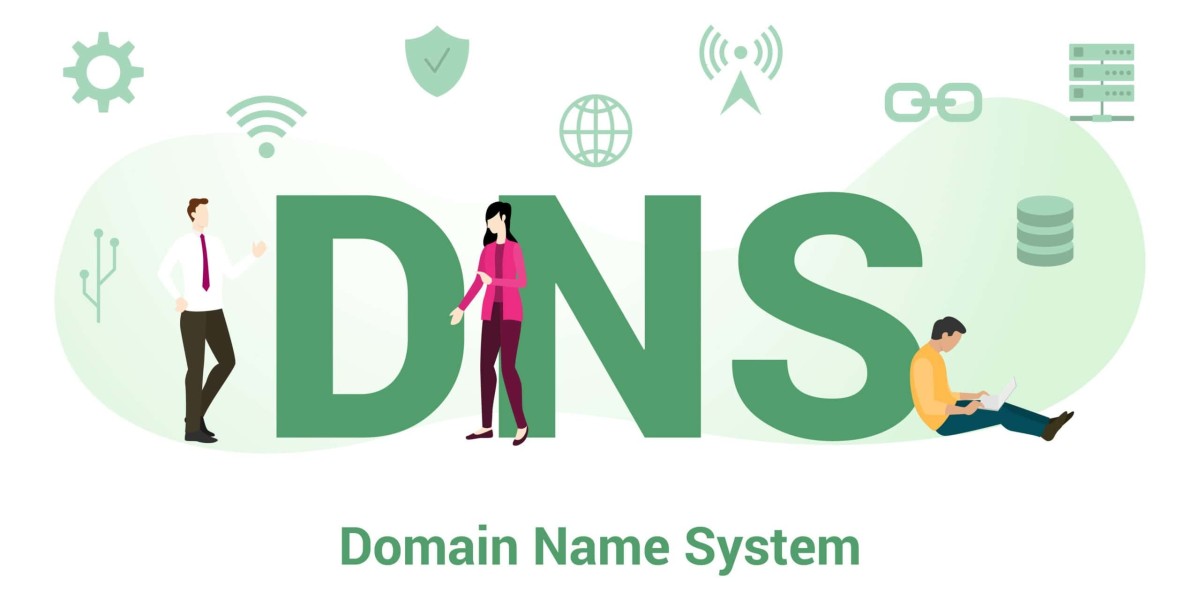The Domain Name System (DNS) is a fundamental aspect of the internet, acting as a bridge between human-readable domain names and the numerical IP addresses that computers use to identify each other on the web. Without DNS, browsing the internet would require remembering long strings of numbers rather than simple names like “example.com.” For businesses, especially in Nepal, understanding DNS is crucial for domain hosting, website management, and digital visibility.
In this comprehensive guide, we’ll explore how DNS works, the importance of choosing a reliable domain name, and how to register and host a domain in Nepal. We’ll also discuss best practices for managing DNS records, ensuring website security, and optimizing DNS settings for better performance.
What is the Domain Name System (DNS)?
The Domain Name System (DNS) is a hierarchical system that translates domain names into IP addresses. When you type a domain name like www.example.com into your browser, the DNS servers search for the corresponding IP address so that the browser can retrieve and display the website.
Key Components of DNS:
Domain Names: Human-readable names like example.com.IP Addresses: Numerical addresses such as 192.0.2.1 that computers use to identify and communicate with each other. DNS Servers: Computers that store and manage DNS records, helping translate domain names into IP addresses. DNS Records: Information stored in the DNS system that helps guide internet traffic to the right destination.
Types of DNS Records:
A Record: Maps a domain name to an IP address. MX Record: Directs emails to the correct mail server for a domain. CNAME Record: Maps one domain name to another (useful for subdomains). TXT Record: Used for text-based information like verifying domain ownership or adding security measures like SPF (Sender Policy Framework) and DKIM (DomainKeys Identified Mail).
Why is DNS Important for Nepal Domain Hosting?
For individuals and businesses in Nepal, DNS plays a crucial role in domain hosting. When you register a domain with a local or international provider, the DNS is automatically configured to point to the hosting server. This allows visitors to access your website through a user-friendly domain name rather than needing to remember complex IP addresses.
Here’s how DNS affects your Nepal domain hosting:
Website Accessibility: Without DNS, users wouldn’t be able to visit websites using simple domain names. DNS ensures smooth browsing by directing users to the correct IP address. Email Functionality: Properly configured MX records allow emails to reach their intended destination, ensuring uninterrupted communication. Security: DNS records, especially TXT and SPF records, are used to enhance security and prevent email spoofing, ensuring your online presence remains safe.
Performance Optimization: DNS settings can impact website speed and reliability. With optimized DNS configurations, you can reduce latency and improve load times, offering a better user experience.
How to Buy and Register a Domain Name in Nepal
Registering a domain name in Nepal is simple but requires attention to a few key details. Here's a step-by-step guide:
Step 1: Choose a Domain Registrar
In Nepal, several companies provide domain registration services. Look for reputable providers that offer robust customer support, reasonable pricing, and easy domain management tools. Some popular domain registrars in Nepal include:
Mercantile Communications Himalayan Hosting Web Host Nepal
These providers offer domain registration for various extensions, including .np, .com, .net, and more.
Step 2: Select Your Domain Name
Choosing the right domain name is critical for branding and online visibility. Consider the following tips:
Keep It Short and Memorable: Aim for a concise name that users can easily recall. Use Keywords: If possible, incorporate keywords related to your business or industry to help with SEO. Choose the Right Extension: For Nepal-based businesses, a .np domain signals local presence and trustworthiness. However, .com remains the most recognized globally.
Step 3: Register the Domain
Once you've selected a domain registrar and chosen your domain name, follow these steps:
Search for your desired domain to check availability. Fill in the necessary details, including contact and payment information. Pay the registration fee (often a yearly fee).
Once registered, your domain is active, and you can manage its DNS settings through the registrar’s dashboard.
Nepal Domain Hosting: Key Considerations
Domain hosting in Nepal refers to the storage and serving of websites to users via the internet. Here’s what you need to know when choosing a hosting provider in Nepal:
Hosting Types:
Shared Hosting: Multiple websites share a single server, making it the most affordable option. Ideal for small businesses or personal websites.
VPS Hosting: A Virtual Private Server offers dedicated resources on a shared server. It’s more expensive but provides better performance. Dedicated Hosting: You have an entire server to yourself. Best for large businesses with high traffic. Cloud Hosting: Websites are hosted on a network of servers, allowing for high scalability and reliability.
2. Local vs. International Hosting Providers:
Local Providers: They offer better support for Nepal-specific needs, lower latency for local users, and often understand local regulatory requirements.
International Providers: While they offer more extensive resources and support, they might not be as responsive to local issues, and latency could be higher for Nepali users.
Some popular hosting providers in Nepal include:
eHosting Server
Web Host Nepal
Prabhu Host
How DNS Affects Website Performance and SEO in Nepal
A fast and reliable DNS setup is critical for website performance and can also impact your search engine ranking. Here’s how DNS influences website speed and SEO:
Reduced Latency: A geographically closer DNS server will result in faster DNS queries, improving the overall speed of your website.
Website Uptime: Using reliable DNS servers ensures minimal downtime, which is crucial for maintaining good SEO rankings.
Security Measures: Adding DNS security features like DNSSEC (DNS Security Extensions) helps prevent attacks such as DNS spoofing and man-in-the-middle attacks, further protecting your website’s reputation.
Best Practices for Managing DNS Records
Once you’ve registered your domain, it’s essential to manage your DNS settings correctly to ensure a smooth user experience and optimal performance.
Keep Your DNS Records Up-to-Date:
Ensure your A, MX, and CNAME records are correctly configured and updated regularly, especially when changing hosting providers. . Use a Reliable DNS Provider:
Opt for a provider that offers fast resolution times and robust security features. Providers like Cloudflare, Google DNS, and Quad9 offer free public DNS services that can improve speed and security.
Monitor DNS Performance: Use tools like Pingdom or DNSPerf to monitor your DNS performance and troubleshoot any issues affecting site speed or accessibility.
Conclusion
The Domain Name System (DNS) is the backbone of the internet, ensuring that users can easily navigate the web using simple domain names instead of complex IP addresses. For businesses and individuals in Nepal, understanding DNS is essential for domain hosting, website management, and digital success. By choosing the right domain, registering with a reliable registrar, and managing DNS records effectively, you can optimize your website’s performance and security, driving greater engagement and growth.
The Domain Name System (DNS) is a fundamental aspect of the internet, acting as a bridge between human-readable domain names and the numerical IP addresses that computers use to identify each other on the web. Without DNS, browsing the internet would require remembering long strings of numbers rather than simple names like “example.com.” For businesses, especially in Nepal, understanding DNS is crucial for domain hosting, website management, and digital visibility.
In this comprehensive guide, we’ll explore how DNS works, the importance of choosing a reliable domain name, and how to register and host a domain in Nepal. We’ll also discuss best practices for managing DNS records, ensuring website security, and optimizing DNS settings for better performance.
What is the Domain Name System (DNS)?
The Domain Name System (DNS) is a hierarchical system that translates domain names into IP addresses. When you type a domain name like www.example.com into your browser, the DNS servers search for the corresponding IP address so that the browser can retrieve and display the website.
Key Components of DNS:
Domain Names: Human-readable names like example.com.IP Addresses: Numerical addresses such as 192.0.2.1 that computers use to identify and communicate with each other. DNS Servers: Computers that store and manage DNS records, helping translate domain names into IP addresses. DNS Records: Information stored in the DNS system that helps guide internet traffic to the right destination.
Types of DNS Records:
A Record: Maps a domain name to an IP address. MX Record: Directs emails to the correct mail server for a domain. CNAME Record: Maps one domain name to another (useful for subdomains). TXT Record: Used for text-based information like verifying domain ownership or adding security measures like SPF (Sender Policy Framework) and DKIM (DomainKeys Identified Mail).
Why is DNS Important for Nepal Domain Hosting?
For individuals and businesses in Nepal, DNS plays a crucial role in domain hosting. When you register a domain with a local or international provider, the DNS is automatically configured to point to the hosting server. This allows visitors to access your website through a user-friendly domain name rather than needing to remember complex IP addresses.
Here’s how DNS affects your Nepal domain hosting:
Website Accessibility: Without DNS, users wouldn’t be able to visit websites using simple domain names. DNS ensures smooth browsing by directing users to the correct IP address. Email Functionality: Properly configured MX records allow emails to reach their intended destination, ensuring uninterrupted communication. Security: DNS records, especially TXT and SPF records, are used to enhance security and prevent email spoofing, ensuring your online presence remains safe.
Performance Optimization: DNS settings can impact website speed and reliability. With optimized DNS configurations, you can reduce latency and improve load times, offering a better user experience.
How to Buy and Register a Domain Name in Nepal
Registering a domain name in Nepal is simple but requires attention to a few key details. Here's a step-by-step guide:
Step 1: Choose a Domain Registrar
In Nepal, several companies provide domain registration services. Look for reputable providers that offer robust customer support, reasonable pricing, and easy domain management tools. Some popular domain registrars in Nepal include:
Mercantile Communications Himalayan Hosting Web Host Nepal
These providers offer domain registration for various extensions, including .np, .com, .net, and more.
Step 2: Select Your Domain Name
Choosing the right domain name is critical for branding and online visibility. Consider the following tips:
Keep It Short and Memorable: Aim for a concise name that users can easily recall. Use Keywords: If possible, incorporate keywords related to your business or industry to help with SEO. Choose the Right Extension: For Nepal-based businesses, a .np domain signals local presence and trustworthiness. However, .com remains the most recognized globally.
Step 3: Register the Domain
Once you've selected a domain registrar and chosen your domain name, follow these steps:
Search for your desired domain to check availability. Fill in the necessary details, including contact and payment information. Pay the registration fee (often a yearly fee).
Once registered, your domain is active, and you can manage its DNS settings through the registrar’s dashboard.
Nepal Domain Hosting: Key Considerations
Domain hosting in Nepal refers to the storage and serving of websites to users via the internet. Here’s what you need to know when choosing a hosting provider in Nepal:
Hosting Types:
Shared Hosting: Multiple websites share a single server, making it the most affordable option. Ideal for small businesses or personal websites.
VPS Hosting: A Virtual Private Server offers dedicated resources on a shared server. It’s more expensive but provides better performance. Dedicated Hosting: You have an entire server to yourself. Best for large businesses with high traffic. Cloud Hosting: Websites are hosted on a network of servers, allowing for high scalability and reliability.
2. Local vs. International Hosting Providers:
Local Providers: They offer better support for Nepal-specific needs, lower latency for local users, and often understand local regulatory requirements.
International Providers: While they offer more extensive resources and support, they might not be as responsive to local issues, and latency could be higher for Nepali users.
Some popular hosting providers in Nepal include:
eHosting Server
Web Host Nepal
Prabhu Host
How DNS Affects Website Performance and SEO in Nepal
A fast and reliable DNS setup is critical for website performance and can also impact your search engine ranking. Here’s how DNS influences website speed and SEO:
Reduced Latency: A geographically closer DNS server will result in faster DNS queries, improving the overall speed of your website.
Website Uptime: Using reliable DNS servers ensures minimal downtime, which is crucial for maintaining good SEO rankings.
Security Measures: Adding DNS security features like DNSSEC (DNS Security Extensions) helps prevent attacks such as DNS spoofing and man-in-the-middle attacks, further protecting your website’s reputation.
Best Practices for Managing DNS Records
Once you’ve registered your domain, it’s essential to manage your DNS settings correctly to ensure a smooth user experience and optimal performance.
Keep Your DNS Records Up-to-Date:
Ensure your A, MX, and CNAME records are correctly configured and updated regularly, especially when changing hosting providers. . Use a Reliable DNS Provider:
Opt for a provider that offers fast resolution times and robust security features. Providers like Cloudflare, Google DNS, and Quad9 offer free public DNS services that can improve speed and security.
Monitor DNS Performance: Use tools like Pingdom or DNSPerf to monitor your DNS performance and troubleshoot any issues affecting site speed or accessibility.
Conclusion
The Domain Name System (DNS) is the backbone of the internet, ensuring that users can easily navigate the web using simple domain names instead of complex IP addresses. For businesses and individuals in Nepal, understanding DNS is essential for domain hosting, website management, and digital success. By choosing the right domain, registering with a reliable registrar, and managing DNS records effectively, you can optimize your website’s performance and security, driving greater engagement and growth.








